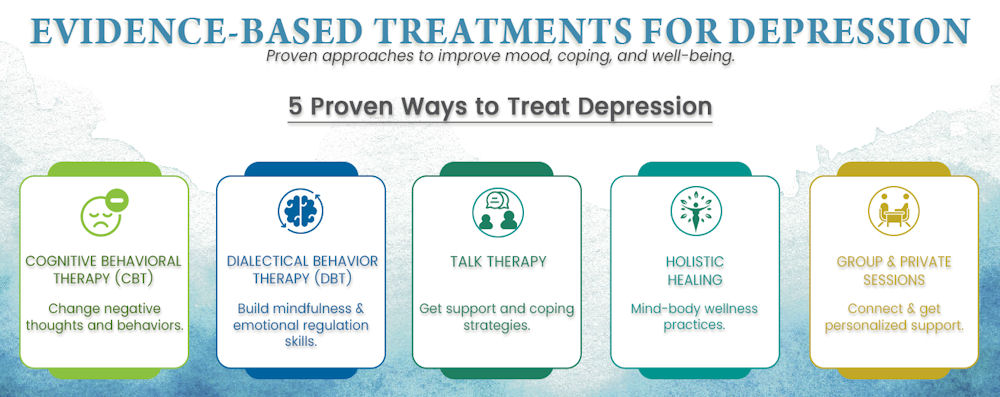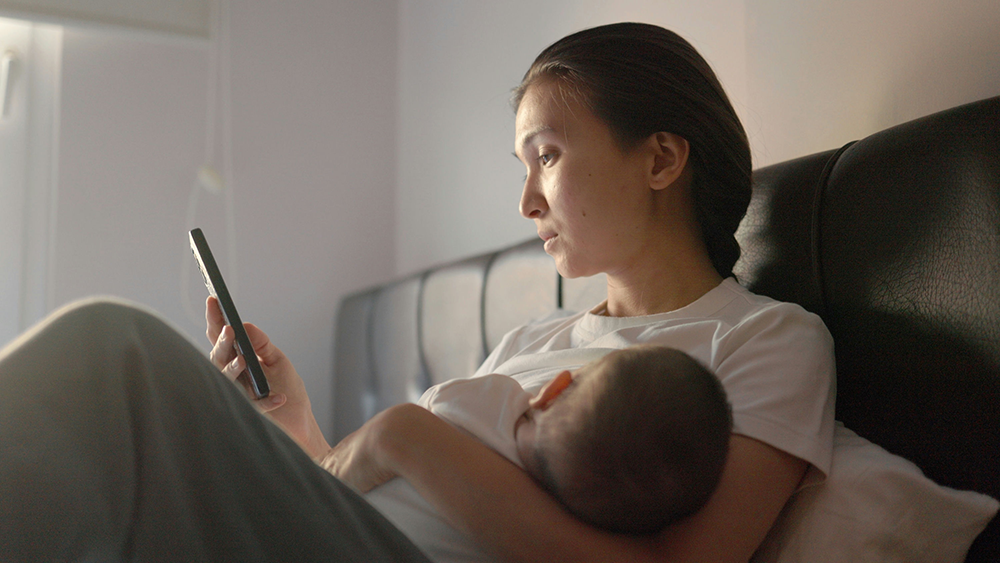Many people are unsure about the difference between feeling sad and experiencing depression. While sadness is a normal emotion that comes and goes, depression is a more persistent condition that can affect daily life.
Depression is a common but serious mood disorder. It affects how you feel, think, and function. Everything from sleeping to eating and even the ability to focus is influenced. It’s important to understand that the symptoms of depression vary for each individual, ranging from mild to severe. While it is normal to experience negative emotions, symptoms of depression that last for at least two weeks need to be addressed by a mental health professional. Experiencing depression or watching a loved one who is depressed can be very challenging, and it’s essential to find quality mental health treatment.

There are multiple types of depression; each varies based on the reason they develop, the severity of symptoms, and the circumstances in which they occur. However, all types of depression include some of the following symptoms:
- Consistent sad or anxious mood
- Pessimism or feeling hopeless
- Irritability, frustration, or restlessness
- Feelings of guilt or helplessness
- Loss of interest in previously pleasurable activities
- Decreased energy/fatigue
- Oversleeping or difficulty sleeping
- Changes in appetite
- Difficulty focusing or making decisions
- Suicidal thoughts or actions
A major depressive episode is categorized as a period of two weeks or more in which a person has a loss of interest and enjoyment in daily activities, a depressive mood, and the majority of the following issues:
- Trouble sleeping
- Changes in eating
- Low energy
- Lack of ability to concentrate
- Decreased sense of self-worth
Dysthymia, or persistent depressive disorder, is a type of depression that affects people with less severe symptoms that last for a longer period of time, typically around two years. These include a lack of interest in normal activities, hopelessness, lack of productivity, and low self-esteem. These feelings, although less severe, can significantly impact a person’s life in various ways, affecting relationships, work, school, and other aspects of life.
This mood disorder occurs in women when they are pregnant or after they have given birth. The symptoms of perinatal depression can vary from mild to severe, but generally include sadness, anxiety, and fatigue. At the same time, many women experience what is commonly called “baby blues,” which is due to the hormonal changes that occur during and after pregnancy. Perinatal depression lasting more than two weeks is something to be concerned about.
Also called seasonal depression, seasonal affective disorder (SAD) is triggered by seasonal changes. It frequently occurs in climates with less sunlight during parts of the year, lasting for four to five months. Seasonal mood changes impact how a person feels, thinks, and handles daily activities. Symptoms include feeling fatigued and depressed during the winter months and increased energy and anxiety during the summer.
When major depression occurs with psychosis, it is called psychotic depression. Psychosis is a mental health disorder that can cause a person to lose track of reality, resulting in delusions or hallucinations. The condition can range from mild to severe. In general, depressive symptoms lean toward depression. This could look like delusions of guilt, poverty, or illness.
Outpatient and Other Levels of Care for Depression Treatment
Depression treatment in Orange County offers different levels of care based on symptom severity and individual needs. The right level of care depends on factors like daily functioning, safety concerns, and previous treatment history.
Outpatient programs involve attending therapy sessions one to three times per week while maintaining daily routines. This format works well for people with mild to moderate depression who can function safely at home and at work.
449 Recovery specializes in outpatient care with flexible scheduling. Their approach includes individual therapy, group sessions, and family involvement when appropriate. Outpatient care allows people to practice new skills in real-world settings while receiving ongoing support.
Intensive Outpatient Programs (IOPs) require three to five days per week for several hours each day. These programs offer more structure than standard outpatient care, yet still allow individuals to sleep at home.
IOPs include group therapy, individual counseling, and skill-building activities. At 449 Recovery, IOPs use evidence-based therapies like cognitive-behavioral therapy and group therapy. This level of care works well for people stepping down from residential treatment or those who need more support than weekly therapy provides.
Residential treatment involves living at a facility for weeks or months. This level of care includes 24/7 supervision, intensive therapy, and medical oversight. Residential programs are typically recommended for severe depression, especially when safety is a concern or other levels of care haven’t been effective.
Some depression treatment centers offer residential programs, though many people with depression can recover successfully with outpatient care.
Contact 449 Recovery Today!
Find The Help You Need By Reaching Out To Us Today!

Evidence-Based Approaches: CBT, DBT, and More
Evidence-based treatments are therapies that have been proven effective through scientific research. These approaches have been tested in clinical studies and consistently show positive results for depression.
Cognitive Behavioral Therapy (CBT) examines the connection between thoughts, feelings, and behaviors. People learn to identify negative thought patterns and replace them with more balanced thinking.
CBT techniques include keeping thought records to track negative thinking, behavioral activation to increase enjoyable activities, and challenging unhelpful beliefs. Research shows CBT can be as effective as medication for many people with depression.
Dialectical Behavior Therapy (DBT) teaches skills for managing intense emotions and improving relationships. DBT includes four main areas: mindfulness, distress tolerance, emotion regulation, and interpersonal effectiveness.
These skills help people cope with difficult emotions without making situations worse. DBT was originally developed for borderline personality disorder but has proven effective for depression, especially when combined with other mental health conditions.
Motivational Interviewing is a counseling approach that helps people explore their feelings about change. Instead of telling someone what to do, therapists help clients discover their own reasons for making positive changes.
This approach works particularly well for people who feel ambivalent about treatment or have tried therapy before without success. The collaborative style helps build motivation from within rather than relying on external pressure.

Addressing Co-Occurring Disorders and Integrating Dual Diagnosis Treatment
Depression and substance use disorders frequently occur together. This combination, called co-occurring disorders or dual diagnosis, affects many people with depression. People may use alcohol or drugs to cope with depression symptoms, but substance use can worsen depression and interfere with your personalized treatment plan.
An integrated program addresses both depression and substance use simultaneously, rather than treating one condition at a time. Depression treatment programs that offer integrated care create better outcomes because they understand how these conditions interact and reinforce each other.

Selecting Ethical and Accredited Depression Treatment
Choosing the right treatment center protects against unethical practices and ensures quality care. Some facilities prioritize profit over patient welfare, making it important to research options carefully.
- Look for Licensing and Accreditation: State licensing from the California Department of Health Care Services means a facility meets basic safety and quality standards. Accreditation from organizations like CARF or The Joint Commission indicates additional quality measures.
- Verify Staff Credentials: Quality treatment centers employ licensed professionals, including psychiatrists, psychologists, therapists, and counselors. Each professional type requires specific education, training, and ongoing certification.
- Check Facility for Ethical Practices: Ethical facilities provide clear information about treatment methods, costs, and what’s included in their programs. They avoid high-pressure sales tactics and give families time to make informed decisions.
Look for transparent communication about treatment approaches and realistic expectations about outcomes. Reputable centers provide references from former clients and maintain positive relationships with local healthcare providers.
Supporting a Loved One Through Depression
Supporting someone with depression requires patience and understanding. Depression affects how people think and feel, making it difficult for them to see hope or believe treatment will help.
Starting conversations about mental health can feel awkward, but simple approaches work best. Try saying “I’ve noticed you seem to be struggling lately,” or “I’m concerned about you and want to help.”
Choose quiet, private settings for these discussions. Avoid trying to solve their problems or minimize their experience. Instead, focus on listening and offering practical support like helping research treatment options or providing transportation to appointments.
Listen without judgment and validate their feelings, even if their experience seems difficult to understand. Responses like “That sounds really hard” or “I’m here for you” show support without trying to fix everything.
Avoid giving advice unless asked, and don’t take their symptoms personally. Depression can make people withdraw or seem irritable, but this reflects the illness rather than their feelings about you. Supporting someone with depression can be emotionally draining. Taking care of your own mental health helps maintain your ability to provide ongoing support.
Navigating Insurance and Costs for Effective Depression Treatment
The Mental Health Parity Act requires insurance companies to cover mental health conditions at the same level as physical health conditions. Most insurance plans now include depression treatment coverage, though specific benefits vary.
Many facilities, including 449 Recovery, accept various insurance plans and can verify benefits prior to treatment. For people without insurance, payment plans and sliding scale fees based on income are often available.
Common insurance considerations include:
- Coverage verification: Contact your insurance company to understand your specific mental health benefits
- Network providers: In-network facilities typically cost less than out-of-network options
- Copays and deductibles: Most plans require some out-of-pocket costs for mental health services

Frequently Asked Questions About Treatment for Depression
Review the answers to these FAQs to learn more about depression treatment.
Treatment duration varies based on individual symptoms and goals, typically ranging from several weeks to several months, depending on the person’s response and treatment approach.
Most centers offer cognitive-behavioral therapy, dialectical behavior therapy, and group counseling, with many also providing family therapy and medication management when appropriate.
Outpatient and intensive outpatient programs are designed to accommodate work schedules, while residential programs typically require time away from employment.
Costs vary by program type and insurance coverage, but most insurance plans cover mental health care at similar rates to medical care under federal parity laws.
Depression Treatment at 449 Recovery
Anyone can be affected by depression. Because it can have such adverse impacts on your life, it is essential to seek support and guidance. Effective and reliable mental health treatment is important to improve mental well-being. At 449 Recovery, we have reliable, affordable, and trustworthy services that can help. Our goal is to utilize evidence-based practices that are focused on your individual needs. Contact us today to learn more about our depression treatment program.
Dr. Sharif is a Licensed Marriage and Family Therapist who joined 449 Recovery in 2020 and oversees clinical operations as the Chief Clinical Officer. He earned his B.A. in Psychology and M.S. in Clinical Psychology from Vanguard University and completed his Doctor of Psychology from California School of Professional Psychology. Since 2011, Dr. Sharif has been dedicated to helping individuals, couples, and families heal from co-occurring disorders, including mental health, relational, and substance use challenges. He has led workshops on family dynamics, attachment injuries, spirituality in sobriety, and the impact of trauma on relationships.





